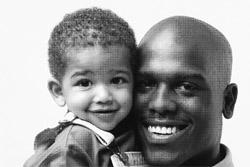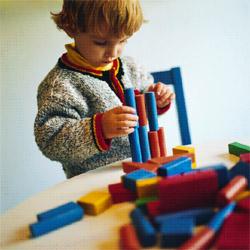Psychology Homework.
Heredity is the transmission of traits from parents to children. What do we inherit from our parents? We can inherit physical characteristics such as height, hair color or eye color, facial features, etc. From time to time, we might hear that we look just like our mother or we're tall just like our father.
Just as we can inherit physical traits from our parents, we can also inherit psychological traits. For example, shyness, aggressiveness, depression or even schizophrenia can all be passed on.
Genes and Chromosomes
| Genes are genetic building blocks found in chromosomes. There are two types of genes, dominant and recessive. There are 23 pairs of chromosomes. Twenty two pairs are identical, but the 23rd is the sex gene determined by the father. If the father contributes an X, then the child is female, whereas a Y is a male child. |
|
Child Development
Children have all the nerve cells that they will ever have even before they are born. Think of these nerve cells as electrical wires that are not connected. Babies crave stimulation, which helps to "connect the wires." Holding an infant, talking to them, reading, and playing with toys all help to stimulate the brain and make these connections.
For certain tasks, there are what are referred to as "windows of opportunity." For example, sight is developed during the third and fourth month of life. Without stimulation of the visual system, connections for sight become lost.
Issues in Child Development
|
| "Give me a dozen healthy infants, well formed, and my own specified world to bring them up in and I'll guarantee to take anyone at random and train him to become any type of specialist I might select - doctor, lawyer, artist, merchant-chief, and yes, even a beggar-man and thief, regardless of his talents, penchants, tendencies, abilities, vocations, and race of his ancestors." |
Just as this was Watson's belief, many factors have been studied trying to determine what is most influential in a child's development. Behaviorists have developed and studied theories of development, looked at environmental factors, parenting styles, birth order effect, etc in terms of studying child development.
Stage Development vs. Continuous Development
Jean Piaget's theory of Cognitive Development is a stage theory
A stage theory refers to the concept that as we develop we go through different stages in terms of our learning.
Jean Piaget's Theory of Cognitive Development consists of four development stages:
| Stage | Age | Concept |
| Sensorimotor | birth-2 years | Children experience things through movement and use of their senses; object permanence. |
| Preoperational | 2-7 years | Children acquire motor skills. |
| Concrete Operational | 7-11 years | Children use logic to think about events. |
| Formal Operational | after age 11 | Abstract reasoning developed. |
Stage Theories of Development
Piaget's Theory of Cognitive Development
all children go through cognitive development stages
cognitive development
Erikson's Psychosocial Stage Theory
chronological stages of development
certain stimuli are needed for children to "master" each stage
Bandura's Social Learning Theory
children learn from role models
behavioral development
Freud's Psychodynamic Theory
early experiences in life influence one's personality later in life
emotional development
Kohlberg's Moral Development Theory
stages of moral development
learning right from wrong is lifelong process
Bowlby's Integrated Attachment Theory
the emotional bond formed between baby and mother is crucial during first two years of life
Nature and Nurture Contributions
The Study of Development looks at Nature vs Nurture. There are numerous debates on each side of these theories.
The Nature Theory is based on the premise that humans behave the way that they do because they are genetically predisposed to doing so.
The Nurture Theory believes that humans behave the way that they do because that is how they were taught. Supporters of this theory believe that environmental factors present in our upbringing are most influential in our behavior.
For example, identical twins (not fraternal) are studied because their genetic make-up is the same. Any differences between twins are due to nurture or the environment.
Nurture
What you have acquired…
Malnutrition:
Growth retardation, underdeveloped brain
Rubella
German Measles, cataracts, heart problems
Thalidomide Usage
Abbreviated limbs...
Physical Development
What do Babies "know" when they are born?
NO, NO, NO ,NO Instincts
Reflexes they possess
Moro
Babinski
Startle
Palmar
Sucking
Tonic Neck
Rooting
Height and Weight
What do babies know?
Babies imitate caregiver's actions (Meltzoff's Studies)
Children prefer to look at human faces when the features are in the correct place (Robert Fantz Studies)
Depth perception (Walk and Gibson)
Categorize objects by color or shape
They "like" bananas and vanilla
Babies prefer complex patterns over simple ones
Check this out:
Interactive Developmental Milestones Chart http://www.cdc.gov/ncbddd/actearly/milestones/
Styles of Parenting
"If I could say just one thing to parents, it would be simply that a child needs someone who believes in him no matter what he does."
~Alice Keliher
Psychologists are also interested in how parents influence child development. According to Diana Baumrind's theory, there are three styles of parenting as outlined below:
| Authoritative | Authoritarian | Permissive |
| Allow natural consequences. | Demands continuously. | Sets no guidelines. |
| Reasonable loss of privileges. | Punishes harshly. | Asserts no authority. |
| Repayment and compensation. | Values obedience. | Remains distant. |
| Grounding | Discourages independence and individuality. | Remains uninvolved. |
| Negotiate contracts. | Exercises physical punishment. | Uses excuses for not spending quality time with the child. |
| Use reasonable time-out. | Resorts to yelling and threatening. | "Orland Park Barbie" |
| Redirect their attention. | Does not allow reasonable choices to the child. |
Development is a Lifelong Process...
Human development is viewed as a lifelong process. Biological, cognitive and psychosocial aspects work separately as well as overlap throughout our lifetime. Psychologists believe that, "adaptation throughout life depends on how each of us negotiates the internal and external factors that enhance or constrain our abilities to reach our full potentials. The essence of lifespan development is in how we build on our strengths to transcend these limitations over time."
http://www.learner.org/discoveringpsychology/development/dev_flash.html
Additional Reading Resources
National Institute of Child Health and Human Development
http://www.nichd.nih.gov/
Birth Order Effect
http://en.wikipedia.org/wiki/Birth_order
DID YOU KNOW?
Research continues to show that the first three years of life are the most critical in terms of emotional and intellectual development of a child. Seventy five percent of brain growth is completed during this time period.
http://www.growingchild.com/brain.html
Babies whose parents talk to them often develop better language skills than babies whose parents do not communicate with them often. Research studies have shown that "at 20 months, babies of talkative parents knew 131 more words than infants of less talkative parents. At 24 months, the difference was 295."
http://www.growingchild.com/brain2.html
Assignment:
You are to answer the following questions in your own words. Please post the questions with your answers in the text box below to submit your work. Remember to use complete sentences, use proper grammar, and don't forget to proofread and spell check your work before submitting it. This may require additional internet research, so be sure to cite your sources.
5. Identify and discuss Kohlberg's three stages of moral development.
6. Explain Freud's beliefs of emotional development based on his Psychodynamic Theory. How is his theory viewed today?
7. What is the National Children's Study? Explain the purpose of this research study and discuss some of the issues being looked at in terms of development.
8. Discuss some of the arguments between stage development and continuous development.
9. Development is seen as a lifelong process. How does development during one period of a person's life relate to their development during another period of their life?
10. In your opinion, what do you believe is most important for healthy child development? How can cultural differences and socioeconomic factors influence development? Answer in a short essay.
Use complete sentences to explain what the following terms mean in your own words:
11. Object permanence
12. Stage development
13. Continuous development
14. Babinski reflex
Think About It
15. Albert Bandura argued that, "aggression in children is influenced by the reinforcement of family members, the media, and the environment." In your own words, write a 100 word paragraph explaining what you think Bandura meant by this statement.





